GALLUP NEWS SERVICE
PRINCETON, NJ -- A new Gallup poll finds Catholics highly critical of their church for the way it has handled the problem of sexual abuse by its priests. Large majorities say the church has done a bad job of dealing with the issue and has been more concerned with protecting its own image than with solving the problem. A majority of Catholics also believes the problem is widespread. While Catholics are divided as to whether the celibacy requirement for priests contributes to the problem, they give widespread support to allowing priests to marry. The poll also shows that the scandal has caused many Catholics to say they are less likely to contribute money to the church, follow the church's teachings, and attend mass.
The poll, conducted in two waves during the month of March, shows that 72% of Catholics say the church has done a bad job in handling the problem of sexual abuse by priests, while just 20% say a good job. In 1993, during the time when similar news stories were being reported, Catholics were not as critical -- though even at that time, a majority said the church was doing a bad job.
| Has the Catholic Church Done a Good Job or a Bad Job in Dealing With the Problem of Sexual Abuse Committed by Its Priests? |
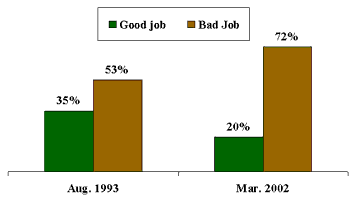 |
Separately, 74% of Catholics say the church has been more concerned with protecting its own image than with solving the problem, while only 17% take the opposite point of view. Again, today's views are more negative than they were in 1993, though -- again -- even then a large majority of Catholics was critical of the church's actions.
| Catholic Church: More Concerned With Protecting Its Own Image or Solving the Problems of Sexual Abuse by Its Priests? |
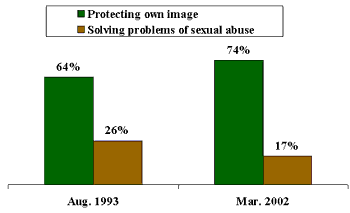 |
There is less consensus among Catholics as to whether the problem is widespread, although 55% believe it is, while 40% say it is not. In 1993, when alleged sexual abuse by Catholic priests was also in the news, Catholics were evenly divided on the issue: 48% said the problem was widespread and 45% said it was not.
| Sexual Abuse By Priests: Widespread Problem or Not? |
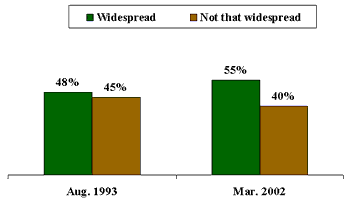 |
The increase in the number who feel the problem is pervasive since 1993 is found almost solely among Catholics age 50 and older. Today, 62% of this older age group say the problem is widespread, up from just 36% who felt that way in 1993. Among Catholics younger than age 50, however, only about half take that position, essentially unchanged from 1993.
Despite their feelings about how widespread sexual abuse is among priests, Catholics do not believe that priests are more likely than the public at large to engage sexual abuse of young people. Only 10% of Catholics believe that sexual abuse of young people is higher among priests than among the general population, but 40% believe the rate is about the same in both groups. Another 43% believe priests are less likely to sexually abuse young people.
| Rate of Sexual Abuse of Young People: Higher Among Priests Than It Is Among the General Population? |
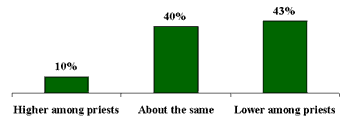 |
Effect of Celibacy
Catholics also appear somewhat divided as to the effect celibacy has on priests' becoming involved in sexual abuse of young people. Forty percent of Catholics say the requirement that priests remain celibate all their lives increases the chances that priests will commit such abuse, while 46% say celibacy has no effect one way or the other, and 9% believe celibacy actually decreases the likelihood of abuse.
Unlike the other issues analyzed, this one shows major differences between devout Catholics (those who attend church weekly or almost weekly -- about half of all Catholics) and the less devout (those who attend church about once a month or less). A majority, 54%, of devout Catholics believe that celibacy makes no difference on whether priests commit abuse, while just 33% say celibacy increases the chances of such behavior. Less devout Catholics, by contrast, are more likely to say that celibacy increases the likelihood of sexual abuse (47%) than to say celibacy has no impact (40%).
Do you think the requirement that priests remain celibate -- [ROTATED: increases the likelihood that they may sexually abuse young people, makes no difference, or decreases the likelihood that they may sexually abuse young people]?
|
Devout Catholics |
Less Devout |
|
|
% |
% |
|
|
Increases |
33 |
47 |
|
Makes no difference |
54 |
40 |
|
Decreases |
9 |
8 |
Despite the division among Catholics about the effect of celibacy, the vast majority -- 75% -- would favor allowing priests to marry and continue to function as priests. Catholics have favored this idea at least since June 1971, when they indicated their support by a 57% to 34% margin. By 1983, support had grown to a two-to-one margin, 62% to 30%, and 10 years later it reached 75% to 21% -- essentially the same level as it is currently.
| Allow Priests To Marry and Continue to Function as Priests? |
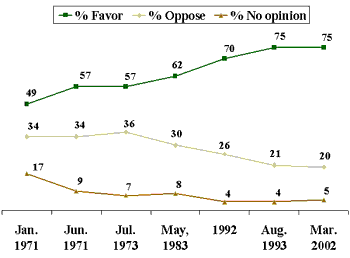 |
Impact of Scandal on the Faithful
Many Catholics say that the issue of priests sexually abusing young people negatively affects their orientation toward the church or its teachings. However, the percentage of devout Catholics who are negatively affected in each area is considerably smaller than the percentage of the less devout.
- Overall, 30% of Catholics say they are less likely to contribute money to the church (23% of the devout say this, compared with 32% of the less devout)
- 23% say they are less likely to follow the church's teachings on matters of faith and morals (just 12% of the devout, compared with 31% of the less devout), and
- 22% say they are less likely to go to mass (16% of the devout, 27% of the less devout).
Overall, 10% of all Catholics say they are less likely to do all three of the above. However, just 5% of devout Catholics say that, compared with 14% of the less devout.
Also, 40% of all Catholics say they are less likely to do at least one of the three items above, which rises to 48% among the less devout, but is just 29% among the devout.
Survey Methods
Results are based on telephone interviews with -- 522 -- Catholics aged 18+ conducted March 18-20 and March 22-24, 2002. The sample of Catholics was based on respondents who identified themselves as Catholic in response to Gallup's standard religious identification question in two national probability samples conducted over the dates listed above. For results based on this combined sample of -- 522 -- Catholics, one can say with 95% confidence that the margin of sampling error is ±5 percentage points. For results based on just "devout" Catholics, those who say they attend church "weekly" or "almost weekly," a sample of -- 249 -- Catholics (48% of the sample), the margin of error is ±7 percentage points.
In addition to sampling error, question wording and practical difficulties in conducting surveys can introduce error or bias into the findings of public opinion polls.
Would you favor or oppose allowing Catholic priests to marry and continue to function as priests?
|
Favor |
Oppose |
No opinion |
|
|
% |
% |
% |
|
|
Catholics |
|||
|
2002 Mar |
75 |
20 |
5 |
|
1993 Aug 3-5 |
75 |
21 |
4 |
|
1992 |
70 |
26 |
4 |
|
1983 May 13-16 |
62 |
30 |
8 |
|
1973 Jul 6-9 |
57 |
36 |
7 |
|
1971 Jun |
57 |
34 |
9 |
|
1971 Jan |
49 |
34 |
17 |
Do you think that sexual abuse of young people by priests is a widespread problem in the United States, or not that widespread a problem?
|
Widespread |
Not that widespread |
No opinion |
|
|
% |
% |
% |
|
|
Catholics |
|||
|
2002 Mar |
55 |
40 |
5 |
|
1993 Aug 3-5 |
48 |
45 |
7 |
|
National Adults |
|||
|
2002 Mar 18-20 ^ |
55 |
35 |
10 |
^ Results from March 18-20 poll of national adults, +/- 3 PCT PTS
Overall, do you think the Catholic Church has done a good job or a bad job in dealing with the problem of sexual abuse committed by its priests?
|
Good job |
Bad job |
No opinion |
|
|
% |
% |
% |
|
|
Catholics |
|||
|
2002 Mar |
20 |
72 |
8 |
|
1993 Aug 3-5 |
35 |
53 |
12 |
|
National Adults |
|||
|
2002 Mar 18-20 ^ |
17 |
68 |
15 |
^ Results from March 18-20 poll of national adults, +/- 3 PCT PTS
Do you think the Catholic Church has been more concerned with protecting its own image or with solving the problems of sexual abuse by its priests?
|
Protecting |
Solving problems |
No |
|
|
Catholics |
|||
|
2002 Mar |
74 |
17 |
9 |
|
1993 Aug 3-5 |
64 |
26 |
10 |
If a priest was known to have sexually abused young people, but had undergone rehabilitation, would you be willing to accept him as your parish priest, or not?
|
Yes, would |
No, would not |
No |
|
|
Catholics |
|||
|
2002 Mar |
21 |
74 |
5 |
|
1993 Aug 3-5 |
35 |
58 |
7 |
Do you think the rate of sexual abuse of young people is -- [ROTATED: higher among priests than it is among the general population, about the same, or lower among priests than it is among the general population]?
|
Higher |
About |
Lower |
No |
|
|
Catholics |
||||
|
2002 Mar |
10 |
40 |
43 |
7 |
Do you think the requirement that priests remain celibate -- [ROTATED: increases the likelihood that they may sexually abuse young people, makes no difference, or decreases the likelihood that they may sexually abuse young people]?
|
Increases |
Makes no difference |
Decreases |
No |
|
|
Catholics |
||||
|
2002 Mar |
40 |
46 |
9 |
5 |
NOTE: THE FOLLOWING QUESTION WAS ASKED OF CATHOLICS IN ONLY THE MARCH 22-24 POLL; IT IS BASED ON 258 CATHOLICS AND HAS A MARGIN OF ERROR OF 6 PCT PTS.
Does the issue of sexual abuse of young people by priests make you less likely to -- [RANDOM ORDER], or not?
BASED ON -- 258 -- CATHOLICS; ±6 PCT. PTS.
A.Go to Mass
|
Yes, less likely |
No, not less likely |
More likely (vol.) |
No opinion |
|
|
% |
% |
% |
% |
|
|
Catholics |
||||
|
2002 Mar 22-24 |
22 |
76 |
1 |
1 |
B.Contribute money to the church
|
Yes, less likely |
No, not less likely |
More likely (vol.) |
No opinion |
|
|
% |
% |
% |
% |
|
|
Catholics |
||||
|
2002 Mar 22-24 |
30 |
70 |
* |
* |
C.Follow the church's teachings on matters of faith and morals
|
Yes, less likely |
No, not less likely |
More likely (vol.) |
No opinion |
|
|
% |
% |
% |
% |
|
|
Catholics |
||||
|
2002 Mar 22-24 |
23 |
74 |
1 |
2 |
SUMMARY TABLE: REACTION TO ABUSE
|
2002 Mar 22-24 (sorted by "yes, very likely") |
Yes, less likely |
No, not |
|
% |
% |
|
|
Contribute money to the church |
30 |
70 |
|
Follow the church's teachings on matters of faith and morals |
23 |
74 |
|
Go to Mass |
22 |
76 |
